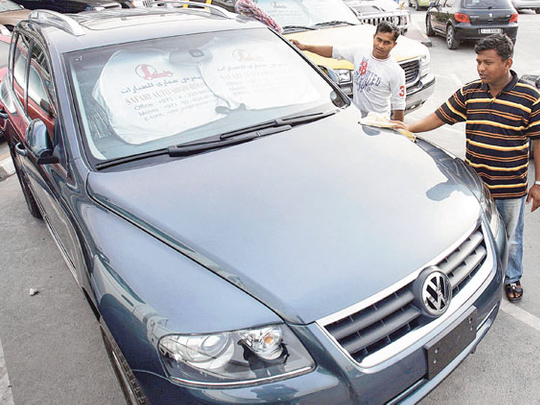
Dubai: Three years ago, a school teacher bought a second hand Lexus car to surprise his wife. The purchase cost him Dh80,000. The wife was obviously elated by the unexpected gift, but it didn't last very long.
The next day, the car's stereo system stopped. On the fourth day, a transmission problem was discovered.
About a week later, the disappointed car buyer decided to take the vehicle to a garage for a comprehensive inspection.
He discovered yet another surprise: the car had been involved in a major road accident, as partly evidenced by a missing airbag that he never noticed at the time of purchase. Needless to say, the guy inherited somebody else's problems and spent a lot of money fixing the mess. "This is what happens to some people in Dubai. They get cheated a lot because they don't know much about cars and the mechanics of a vehicle," recalls Rizwan Ali, who runs a family-owned business, Salim Ali Bin Haider Garage in Dubai
As a vehicle repair workshop manager, Ali knows very well the financial consequences of an impulsive car purchase. That is why he strongly advises car buyers to subject the vehicle to a comprehensive test before they part with their cash.
However, if you can't tag a mechanic along and you're left on your own to check the car, experts recommend some tips to ensure that you're not buying someone else's troubles.
Checking the car
Check the car in broad daylight and watch out for any scratches, corrosions, holes, rusts, including discrepancies that may indicate the car has been repainted, retouched or repaired after a major collision.
Corrosion or rust can imply that some low-cost bodywork has taken place or that the car has not been taken good care of. A road accident may have undermined the car's reliability and life expectancy.
"Tap on the body of the car. If you hear a different sound that suggests the vehicle has been padded, it is likely that it has been retouched after an accident," says Khalid, a used car buyer in Dubai.
Have someone rev up the engine while you check the exhaust. Make sure it doesn't pump out dark or maybe black, grayish smoke.
Pop the engine hood, take out the dipstick and try to smell if the oil is fresh. If it's not, you should worry. "Don't forget to check the tyres as well. Make sure the tyres are not more than two years old. You will find that out by simply checking the time stamp that is clearly shown on the tyre. There, you will see the week and year the tire was manufactured," said Ali.
Check the car's interiors and find out if the seats, dashboards or door sidings need to be fixed. Turn the engine on and let it idle. "See if you feel any vibration while the engine is on. Then, raise the engine speed to 3,000 rpm and check if there's any humming noise coming from the engine," says Ali.
"Take the car to a test drive. If it's automatic, the shifting has to be very smooth. Jerky, sloppy shifting is not a good sign. The sound of the engine should not make you feel like you're driving a tractor. The wheel alignment has to be accurate and when you apply the brakes, you should not feel any vibration."
"Customers should test drive until satisfied that the car is for them. It's not the duration of the drive, rather how the car feels on the road, how it handles around corners, how the brakes feel or if you're comfortable with the controls and you're sure it can do the day-to-day job you need it for," advises Colin Cordery of Al-Futtaim Automall.
And don't forget to take the chassis number to a car dealer and check the car's service history.








